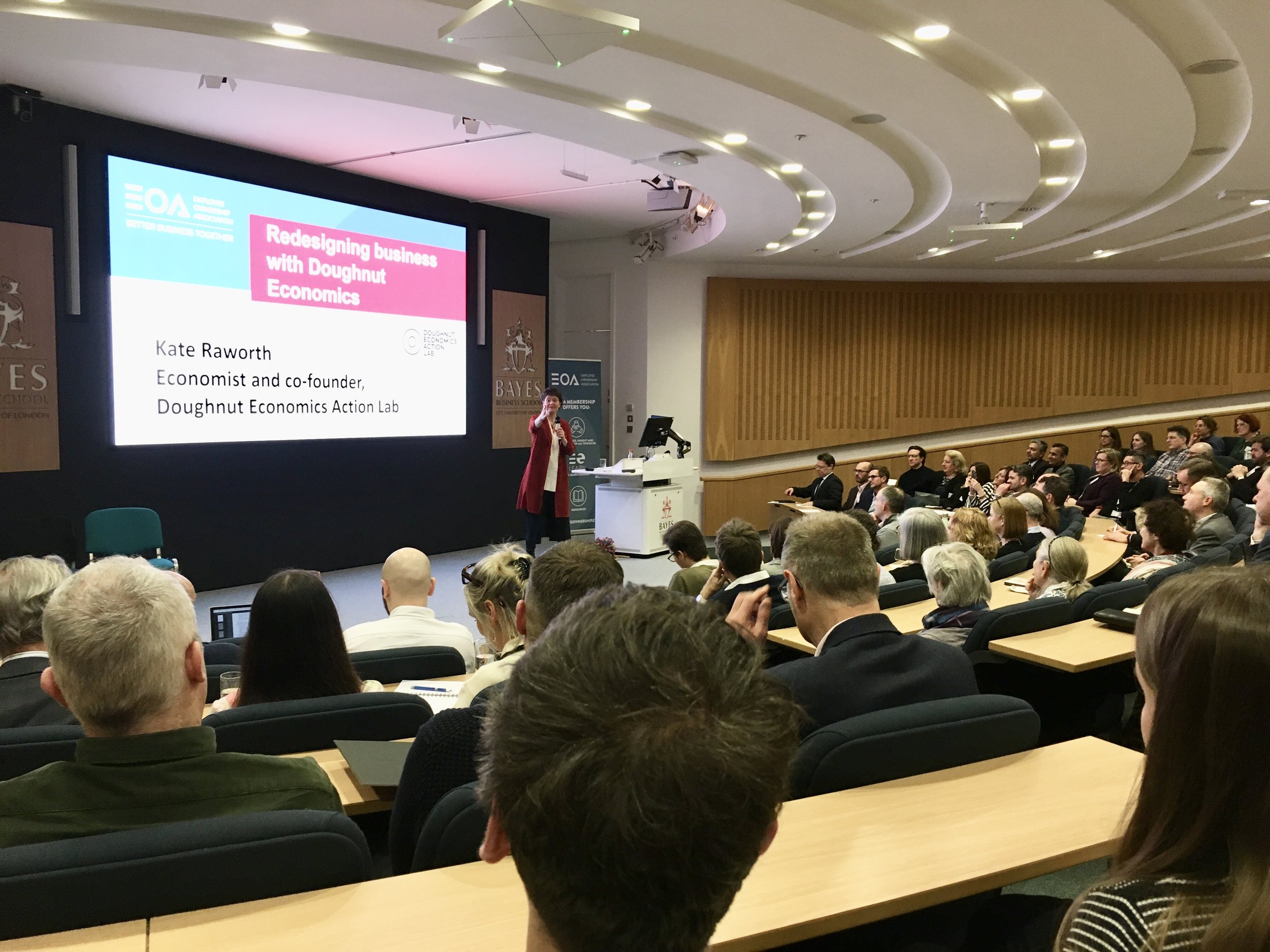Doughnut economics – the challenge and opportunity for EO
Doughnuts, hosepipe and the future of the planet… not quite the mix you’d expect to find in your usual business lecture, but then Kate Raworth isn’t quite your usual business lecturer. She’s the influential economist focused on making 21st century economics fit for the ecological and social realities of today.
She was also the inspirational speaker at the Employee Ownership Association’s annual Robert Oakeshott Lecture at Bayes Business School in London last week.
Kate’s topic? ‘Redesigning business with Doughnut Economics’ and, specifically, the opportunity for employee-owned businesses to help society meet the challenge to change.
As she explained: ‘Currently, we are a world perilously out of balance, overshooting our planetary boundaries. We need new theories, business models, government policies and ways of living to turn this around…. We need to become regenerative and distributive to thrive.’
Her challenge to the audience of EOA members and advocates was clear: ‘Employee ownership is intentionally distributive by design – can it be regenerative too?’
Redesigning business to be a force for good
Our MD Jeremy Gadd attended the event and was intrigued by what he heard from Kate and her colleague Enrich Sahan, Business and Enterprise Lead at the Doughnut Economics Action Lab.
He was also interested in Kate’s response to the questions the audience asked, including his own about the most common ‘yes but…’ she hears when discussing doughnut economics with businesses.
The answer? ‘Yes but… the market or my shareholders won’t take it,’ she revealed. ‘The beauty is we’ve shown the design can change that.’
‘It was certainly a thought-provoking afternoon,’ Jeremy says.
‘What was so appealing about Kate’s presentation on doughnut economics wasn’t the academic interest it stimulated or the ‘yes but…’ question, but how easy it is to see why employee-owned organisations are by their nature well-placed to embrace the concept and vision that was shared. They’re the ideal recipients of doughnut thinking!’
Why? ‘Because when people understand the challenge they face, the choices they can make and are given the freedom to make these choices, empowering them through the culture of employee ownership releases so much positive energy,’ Jeremy replies.
‘This energy can be such a force for good and if, like me, you believe that business can be a force for good and that true change will only come through cultural entrepreneurship, then the scary challenges we face every day become exciting opportunities to embrace.
‘That feels a little easier when you have a genuine stake in the place where you work.’
Empowering employees to make a difference
Of course, for this to happen in practice, employee ownership needs to be more than a description on a piece of paper. The ability to maximise both its commercial and social potential requires a genuine culture of shared ownership across all levels of the organisation, which takes time and energy to evolve.
‘Currently, we are a world perilously out of balance, overshooting our planetary boundaries. We need new theories, business models, government policies and ways of living to turn this around…. We need to become regenerative and distributive to thrive’
Kate Raworth, ecological economist and EOA guest speaker
In our work at JGA, Jeremy says he’s often asked: ‘How do you know when a business has really embraced employee ownership?’. This question was on his mind as he listened to Kate’s view that ‘being an EO business is a very good starting point for redesigning business’.
His own view is that it starts with clarity about the responsibility, opportunities and rewards of EO.
‘People freely share information, ideas and challenge,’ he explains. ‘The employee owners have a clear sense of purpose, understand their role in the organisation and believe they truly matter and can make a difference.
‘You know when a business has really embraced EO because you can see, hear and feel it all around you. There’s a palpable belief that anything is possible.’
Looking forward to a ‘brilliant year’
The afternoon started – and closed – with the opportunity to network with other EOA members as well as meet several of the EOA’s team who had travelled down from Hull to host the event, which was sponsored by Brabners LLP.
This included EOA Chief Executive James de le Vigne who said he was delighted that the first in-person Robert Oakeshott Lecture for three years had attracted such a strong gathering of ‘employee ownership pioneers and advocates’.
Even without the prospect of more doughnut economics, he confirmed he was ‘very excited’ for the EO sector’s future as he predicted a ‘brilliant year ahead’.
Want to know how JGA’s transition, people and governance services can support you and your EO business?



